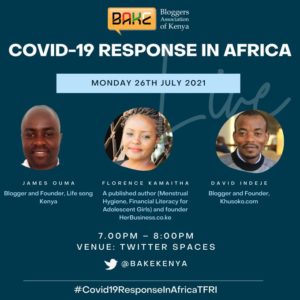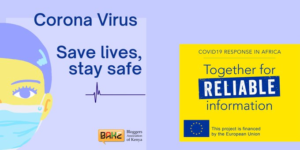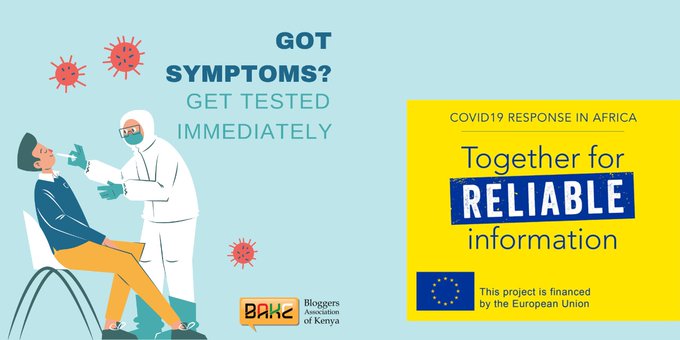Lack of enough data, proper research, proper planning, and compassion towards each other are among the factors hampering the fight against Covid -19 in Kenya.
These emerged at a Twitter spaces discussion hosted by the Bloggers Association of Kenya (BAKE) on 26th July 2021 with panelists James Ouma of Lifesong, Influencer Florence Kamaitha of Her Business.co.ke and Journalist David Indeje who also doubles up as the Khusoko.com founder.
The discussion was part of the Covid-19 response project supported by Deutsche Welle Akademie (DW) and The European Union.
The three, have been on the forefront and laid down the emerging Covid-19 issues below to the audience,

- Government not sharing data
Granted, the government has done a fairly good job of sharing the number of deaths so far, people who have contracted the disease, those who have been vaccinated, and so on. This is done on a daily basis by Cabinet Secretary Mutahi Kagwe or a member of it his ministry. While this is a good move, Ms. Kamaitha was emphatic that the government was not sharing enough data.
“Government not sharing data about the people who took care of themselves at home and were cured so we should share information with each other. We are on our own so let us engage in practical solutions like sharing food and buying masks for those who cannot afford, “she said.
Kamaitha added that we need more data on the pandemic to avoid strained facilities and strained human resources and to also know how the vaccines are being administered as while the urban and middle-class are scrambling for the vaccine, their counterparts in the village are not as welcoming to the idea.
“Having the fatality rate of COVID-19 has helped us understand its severity, identify at-risk populations, and evaluate the quality of healthcare systems in the country,” she pointed out
- Financial Literacy
One of the worst effects of the Corona pandemic was the loss of jobs of by quite a number of people as the economy was badly affected; a frustration Kenya shares with the rest of the world. So many people were caught off guard as they did not know how to live a life without the guarantee that comes with a salary.
Others had never saved for a rainy day while another group suddenly found themselves with much money after being sent home but it is now all gone. On the flipside, some people have made much, money because of the pandemic and do not know how to properly manage their funds. The audience learned that Kenyans need financial literacy to make informed decisions on their spending habits.

- More research is needed
So far, there have only been knee-jerk reactions to issues as they emerge and now that the pandemic is on its fourth wave in the country, we need holistic research to cover various issues so that there can be proper planning and execution.
“The government did not have a practical plan for Kenyans on Covid-19; not well-equipped hospitals, not information,” said Kamaitha
Ouma pointed out that most women are unable to find work during the pandemic and the reasons for this should be established alongside proper recommendations that can help address the situation.
In most families, women have been affected as the primary providers. Due to the covid-19 restrictions, they were not able to access jobs to fend for their families
- We need more compassion towards each other
As aforementioned, quote a number of people have been affected financially and there is, therefore, a need to have more compassion to those around us. Ouma who has been at the forefront of helping out disadvantaged families said: “Covid gave Kenyans an opportunity to serve poor families like we have never served before.”
He added that we should learn to share; food, job openings and take care of each other as quite a number of people have been affected.
- Domestic Violence
It is an open secret that cases of domestic violence have spiraled since the first case of Covid-19 was reported in Kenya and the situation is not getting any better with killings each day attributed to poverty or people affected mentally among other issues. On this, all three panelists were very empathic that we need to report them with Kamaitha adding that we need to have clearer and accessible ways of reporting domestic violence.
“Covid-19 showed us that we lack safe houses for girls and women. Rape cases, gender-based violence cased were on the rise during the pandemic,” said Kamaitha
While lauding efforts to come up with safe houses for affected people Kamaitha said: “We don’t have enough safe houses but there have been some efforts with government houses being turned into safe houses.”

- People using social media, blogs to tell their stories on Covid-19
As the old adage goes, the wearer of the shoe is the one who knows its pinch and the people who have been affected directly or indirectly are now coming out to tell stories of their walk to recovery, how they dealt with the death of their loved ones or experiences getting the vaccine. A good case in point is the Orange Democratic Movement Director of Communication Philip Etale who took to social media to speak about getting the condition for a second time. There is also blogger Wanjiru Kihusa of Still a Mum who also wrote about her experience getting the corona vaccine in Dubai among others.
- Need for more awareness
It is very clear that we are not yet out of the woods and despite the soaring number of cases and deaths related to Corona complications, we are still seeing citizens attending public gatherings at the invite of politicians. While speaking on this, Indeje expressed disappointment that people are still not taking any precautions as advised.
“Across East Africa, it’s only Kenya where we have high numbers. We still have transport vehicles not promoting social distancing, people not wearing masks and so much more,” he said.
- Journalists, content creators suffering from mental health issues
As mentioned above, quite a number of families are facing issues related to poverty, domestic and sexual violence with Kenya recording a very big number of teenage pregnancies. All these are not easy to take in day after day, speaking about them and not seeing any tangible action on them. All these have led many journalists and content creators to suffer from mental health issues and have had to seek help for the issues.
- The gains
Despite all that is happening, it has not all been doom and gloom as Indeje was quick to point out as the government did come out in support of its citizens by waiving some taxes on essential goods. The situation has since been reversed but it helped quite a number of citizens stay afloat. In this regardKamaitha pointed out that a textile factory had also been converted into a face mask-producing factory –
“The government deserves a pat on the back for some measures that cushioned citizens such as waived taxes that only made a comeback this year,” said Indeje
- Disinformation and misinformation the weakest link in the fight against the Corona pandemic
The spread of fake news, disinformation & conspiracies on the coronavirus pandemic on the internet presented a major challenge to the health authorities, fact-checkers, and frontline stakeholders battling to stop the spread. The same situation prevails with the accessibility, distribution, and uptake of the Corona vaccine and there is still a need for more people to counter-check and disabuse the fake news.

